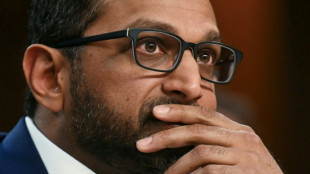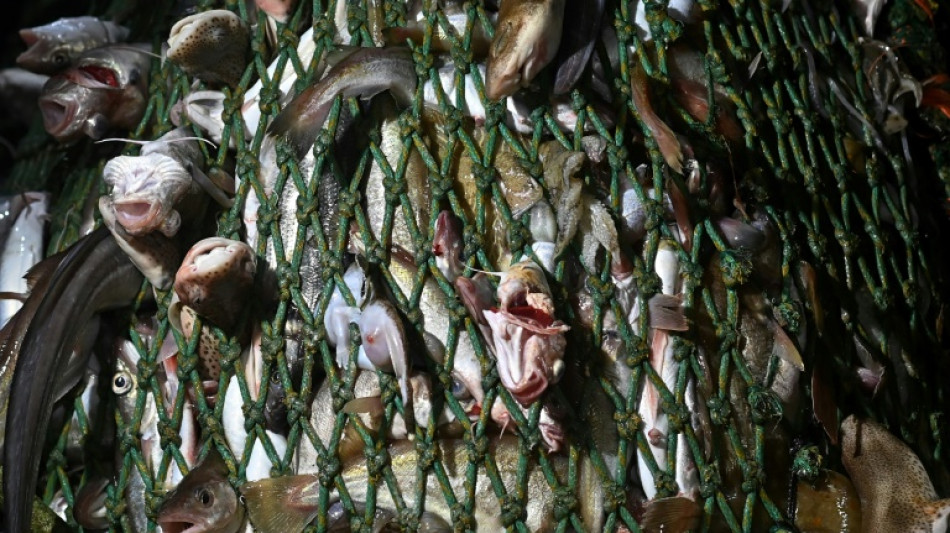
-
 India ready to rev up chipmaking, industry pioneer says
India ready to rev up chipmaking, industry pioneer says
-
Australian Rules axes 'centre bounce' after 130 years

-
 Rangers searching for Europa League respite, Villa visit Feyenoord
Rangers searching for Europa League respite, Villa visit Feyenoord
-
Crystal Palace soaring under Glasner ahead of European bow

-
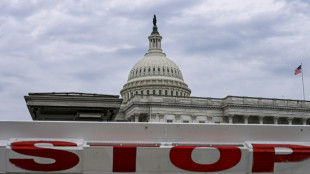 Asian stocks mixed, Wall St futures drop as US heads for shutdown
Asian stocks mixed, Wall St futures drop as US heads for shutdown
-
Suarez double in vain as Chicago sink Miami to clinch playoff berth

-
 England's 'outsiders' aim to break trophy drought at Women's Cricket World Cup
England's 'outsiders' aim to break trophy drought at Women's Cricket World Cup
-
Indigenous survivors recount past horrors at Canada residential school

-
 Hitmaker Max Martin back with Taylor Swift for 'Showgirl'
Hitmaker Max Martin back with Taylor Swift for 'Showgirl'
-
'Showgirl' conquers showbusiness: Taylor Swift releases 12th album on Friday

-
 Former Wallabies coach Cheika joins Sydney Roosters
Former Wallabies coach Cheika joins Sydney Roosters
-
South Korea posts record semiconductor exports in September

-
 Rugby World Cup draw set for December 3
Rugby World Cup draw set for December 3
-
Strong quake in central Philippines kills 19 as search ongoing

-
 Chelsea memories don't 'feed' Mourinho after return ends in defeat
Chelsea memories don't 'feed' Mourinho after return ends in defeat
-
OpenAI launches Sora 2 with TikTok-style app

-
 Nike shares rally on progress in turnaround
Nike shares rally on progress in turnaround
-
Liverpool lose to Galatasaray in Champions League, Chelsea beat Mourinho's Benfica

-
 Stars align for Louis Vuitton, Stella McCartney at Paris Fashion Week
Stars align for Louis Vuitton, Stella McCartney at Paris Fashion Week
-
Tigers down Guardians, Cubs edge Padres in baseball playoffs

-
 Mourinho's Benfica beaten on Chelsea return in Champions League
Mourinho's Benfica beaten on Chelsea return in Champions League
-
Beaches shut on Spain's Ibiza as downpours spark floods
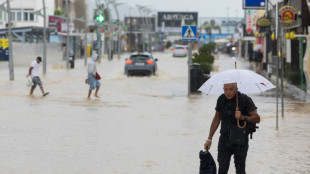
-
 Liverpool slump to Champions League defeat at Galatasaray
Liverpool slump to Champions League defeat at Galatasaray
-
Spurs snatch late draw at Bodo/Glimt in Champions League

-
 Mourinho's Benfica beaten on Chelsea return
Mourinho's Benfica beaten on Chelsea return
-
Dow ends at record as US stocks shrug off shutdown risk

-
 UN Security Council OKs new military force to fight Haiti 'terrorist' gangs
UN Security Council OKs new military force to fight Haiti 'terrorist' gangs
-
Dominant Inter sweep past Slavia Prague in Champions League

-
 Bad Bunny Super Bowl show has MAGA hopping mad
Bad Bunny Super Bowl show has MAGA hopping mad
-
Amazon adds AI muscle to connected home lineup

-
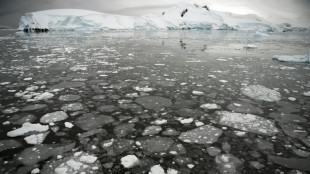 Antarctic sea ice hits its third-lowest winter peak on record
Antarctic sea ice hits its third-lowest winter peak on record
-
UN Security Council approves new military force to fight Haiti gangs

-
 Dolphins' Hill out for season after knee surgery
Dolphins' Hill out for season after knee surgery
-
Rodri 'not ready' for rigours of Man City schedule, says Guardiola

-
 With all-or-nothing Gaza plan, Trump turns tables for Israel
With all-or-nothing Gaza plan, Trump turns tables for Israel
-
Trump announces Pfizer deal he says will lower certain drug prices
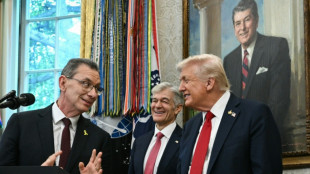
-
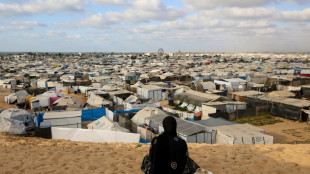 Trump gives Hamas '3 or 4 days' on Gaza deal
Trump gives Hamas '3 or 4 days' on Gaza deal
-
Real Madrid thrash Kairat with Mbappe hat-trick

-
 Deepti, Amanjot fire as India crush Sri Lanka in Women’s World Cup opener
Deepti, Amanjot fire as India crush Sri Lanka in Women’s World Cup opener
-
Deadlines loom for Milan's Olympic village as Winter Games near

-
 At least 5 dead after strong quake in central Philippines
At least 5 dead after strong quake in central Philippines
-
Estonia PM says Russia incursions aim to distract EU from Ukraine: AFP interview

-
 DR Congo ex-president Kabila sentenced to death in absentia for 'treason'
DR Congo ex-president Kabila sentenced to death in absentia for 'treason'
-
Trump says US government will 'probably' shut down

-
 Board of Spain's Sabadell bank rejects improved BBVA takeover bid
Board of Spain's Sabadell bank rejects improved BBVA takeover bid
-
Howe blasts irrelevant criticism of Woltemade after 'idiot' jibe

-
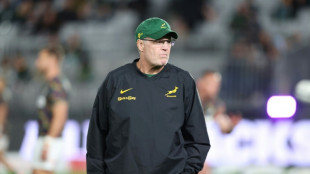 Erasmus ready for 'high stakes' Argentina clash in Rugby Championship finale
Erasmus ready for 'high stakes' Argentina clash in Rugby Championship finale
-
Starmer vows to fight for Britain's 'soul', thwart far right

-
 Strong quake causes damage, panic in central Philippine island
Strong quake causes damage, panic in central Philippine island
-
PSG must keep Barca's 'Harry Potter' Pedri at bay: Luis Enrique


World coming up short on promised marine sanctuaries
A global target of having 30 percent of the oceans become protected areas by 2030 is looking more fragile than ever, with little progress and the United States backing away, conservationists say.
"With less than 10 percent of the ocean designated as MPAs (marine protected areas) and only 2.7 percent fully or highly protected, it is going to be difficult to reach the 30 percent target," said Lance Morgan, head of the Marine Conservation Institute in Seattle, Washington.
The institute maps the MPAs for an online atlas, updating moves to meet the 30 percent goal that 196 countries signed onto in 2022, under the Kunling-Montreal Global Biodiversity Framework.
The ambition is notably at risk because "we see countries like the US reversing course and abandoning decades of bipartisan efforts" to protect areas of the Pacific Ocean, Morgan said.
That referred to an April executive order by President Donald Trump authorising industrial-scale fishing in big swathes of an MPA in that ocean.
Currently, there are 16,516 declared MPAs in the world, covering just 8.4 percent of the oceans.
But not all are created equal: some forbid all forms of fishing, while others place no roles, or almost none, on what activities are proscribed or permitted.
"Only a third of them have levels of protection that would yield proper benefits" for fish, said Joachim Claudet, a socio-ecology marine researcher at France's CNRS.
Daniel Pauly, a professor of fisheries science at Canada's University of British Columbia, said "the marine protected areas have not really been proposed for the protection of biodiversity" but "to increase fish catches".
A proper MPA "exports fish to non-protected zones, and that should be the main reason that we create marine protected areas -- they are needed to have fish", he said.
When fish populations are left to reproduce and grow in protected areas, there is often a spillover effect that sees fish stocks outside the zones also rise, as several scientific journals have noted, especially around a no-fishing MPA in Hawaiian waters that is the biggest in the world.
One 2022 study in the Science journal showed a 54 percent in crease in yellowfin tuna around that Hawaiian MPA, an area now threatened by Trump's executive order, Pauly said.
- Fishing bans -
For such sanctuaries to work, there need to be fishing bans over all or at least some of their zones, Claudet said. But MPAs with such restrictions account for just 2.7 percent of the ocean's area, and are almost always in parts that are far from areas heavily impacted by human activities.
In Europe, for instance, "90 percent of the marine protected areas are still exposed to bottom trawling," a spokesperson for the NGO Oceana, Alexandra Cousteau, said. "It's ecological nonsense."
Pauly said that "bottom trawling in MPAs is like picking flowers with a bulldozer... they scrape the seabed".
Oceana said French MPAs suffered intensive bottom trawling, 17,000 hours' worth in 2024, as did those in British waters, with 20,600 hours. The NGO is calling for a ban on the technique, which involves towing a heavy net along the sea floor, churning it up.
A recent WWF report said that just two percent of European Union waters were covered by MPAs with management plans, even some with no protection measures included.
The head of WWF's European office for the oceans, Jacob Armstrong, said that was insufficient to protect oceanic health.
Governments need to back words with action, he said, or else these areas would be no more than symbolic markings on a map.
P.Keller--VB

